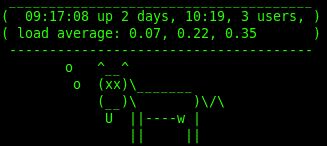Frivolous statistics of the home server :)

On the rights of a Friday post, we will teach a cow to speak :)
Using cowsay , we show free space, temperature of screws and processor, uptime.
In order to amuse myself, I decided to display the information about the home server in a joking manner. We look at everything that happened under the cut.
The conclusion here is such simple information is a simple PHP script that, thanks to the web server, can be viewed from anywhere using a browser.
________________________________________________________________
(Filesystem Size Used Avail Use% Mounted on)
(/ dev / sda1 11G 1.9G 8.7G 18% /)
(tmpfs 253M 0 253M 0% / lib / init / rw)
(udev 10M 668K 9.4M 7% / dev)
(tmpfs 253M 0 253M 0% / dev / shm)
(/ dev / mapper / lvmvolume-arch)
(3.7T 3.7T 5.2G 100% / arch)
(/ dev / sda3 584G 579G 5.6G 100% /arch/.Downloading)
-------------------------------------------------- --------------
o ^ __ ^
o (oo) \ _______
(__) \) \ / \
|| ---- w |
|| ||
CPU 31 C Intel (R) Pentium (R) III CPU - S 1400MHz
/ dev / sda 24 C SAMSUNG HD642JJ
/ dev / sdb 31 C Hitachi HDT721010SLA360
/ dev / sdc 20 C SAMSUNG HD154UI
/ dev / sdd 26 C ST31500541AS
Linux server 2.6.26-2-686 # 1 SMP Wed Feb 10 08:59:21 UTC 2010 i686 GNU / Linux
uptime: 10:43:29 up 16 days, 16:59, 1 user, load average: 0.02, 0.04, 0.00Source code
// cowsay disk usage
system("df -h | perl /usr/games/cowthink -n");
echo "\n";
// CPU thermal info
$cpu_thrminfo = exec('cat /proc/acpi/thermal_zone/THRM/temperature');
$cpu_thrminfo = explode(':', $cpu_thrminfo);
echo "CPU\t\t", trim($cpu_thrminfo[1]);
// CPU model name
$cpu_mdl = exec("cat /proc/cpuinfo | grep -i 'model name'");
$cpu_mdl = explode(':', $cpu_mdl);
echo "\t", trim($cpu_mdl[1]), "\n";
echo "\n";
// HDD temperature
$hdd_list = exec('nc localhost 7634');
$hdd_list = trim($hdd_list, '|');
foreach (explode('||', $hdd_list) as $hdd_temp)
{
$hdd_temp = explode('|', $hdd_temp);
echo $hdd_temp[0], "\t", $hdd_temp[2], ' ', $hdd_temp[3], "\t", $hdd_temp[1], "\n";
}
// uname && uptime
echo "\n", `uname -a`;
echo 'uptime:', `uptime`;
?>
* This source code was highlighted with Source Code Highlighter.PS A running hddtemp daemon on port 7634 is required for operation.
